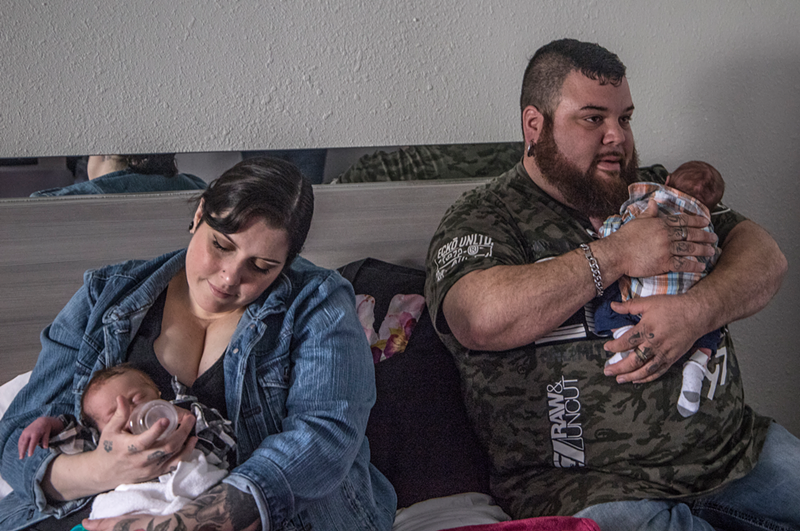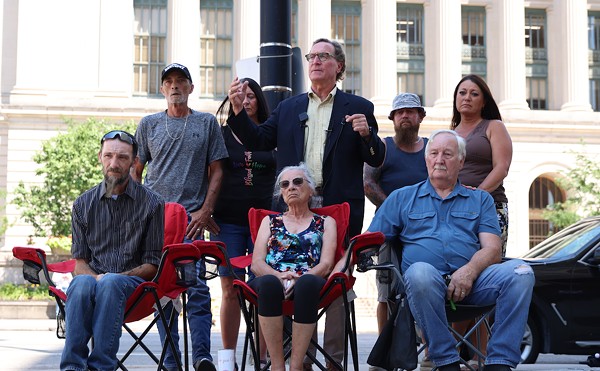Veronica Mills was in labor with twins in a Cincinnati hospital — four weeks early — when she got a text from her roommate, who had just tested positive for COVID-19.
The gist of that text: Don’t come back to the apartment.
Mills’ mind reeled. In addition to the worries about her twin boys, now she would need to figure out a living situation for her young family.
Her partner Richard Hartman’s living space was very small and didn’t allow for additional residents.
But after Mills ended up spending a night in a homeless shelter while her babies stayed at the hospital, Hartman called Maslow’s Army, a scrappy nonprofit that operates in Cincinnati and Northern Kentucky recommended by a longtime friend. The group quickly put the four up in a hotel room in Florence.
“I was like, ‘I surely can’t go back there,’ ” Mills says of her apartment as she cradles one of her now-two week old twins in a cheerful suite. “It kind of hit me all at once. I was trying to figure out where I’m going to go, what am I going to do. I’m just trying to take it day by day now. I’m still healing from everything.”
Sam Landis is the founder and director of Maslow's Army. He says the nonprofit is renting about 60 rooms housing 130 people, including 25 children, in four hotels — at least as long as the group's funding holds up, and if local officials allow them to continue.
Florence's mayor has raised alarms about the practice. So has the Northern Kentucky Health Department, saying it is unclear if Maslow's Army is practicing proper safety precautions around social distancing, screening for COVID-19 and other measures.
But Landis says the group is abiding by all rules and guidelines and has ceased bringing people from Cincinnati into the Northern Kentucky hotels.
At the Florence hotel just off I-75, a volunteer named Denise makes the rounds once a day to take and record everyone’s temperatures. Two volunteers in masks and gloves — everyone is wearing masks and gloves when they're not in their rooms — pack up lunches.
Three meals a day, résumé help, case work and education about how to properly sanitize are all part of the deal, Landis says.
“We ask people to stay in their rooms for the most part,” he says. “If you have to get out, there are plenty of trails around to get exercise.”
The bulk of those supported by Maslow’s Army have been here about two weeks, Landis says. They’ve faced a varied list of precarious situations familiar to homeless advocacy groups. That list is exacerbated to one degree or another by the COVID-19 crisis, which social service providers worry could spread quickly in area shelters.
As COVID-19 continues to spread, Ohio Gov. Mike DeWine issued a stay at home order for the state effective March 23. Kentucky Gov. Andy Beshear has issued similar orders and additional ones ordering Kentuckians not to cross state lines.
The stay at home orders don’t apply to those experiencing homelessness, but social service providers say many current shelter situations aren’t equipped to deal with a world in which people need to stay six feet apart due to a highly contagious and sometimes-deadly respiratory illness.
The hotel rooms are meant to keep people off the streets and out of shelters until the crisis passes. Other local social service groups have made similar efforts.
Family and women’s shelters run by the Interfaith Hospitality Network, Shelterhouse and others in Cincinnati began moving many of their residents, especially those at high risk due to COVID-19, into hotel rooms to prepare for the pandemic a couple weeks ago.
In an effort to keep those who might have the virus from spreading it in shelters, the City of Cincinnati set up a triage center at the Over-the-Rhine Community Center. That space has 15 beds for those experiencing symptoms and awaiting test results for COVID-19 and another 15 beds for those who have a confirmed illness.
The United Way of Greater Cincinnati has given $180,000 toward the hotel rooms and triage efforts, and the Greater Cincinnati Foundation has also provided funding. Groups like the Greater Cincinnati Homeless Coalition, Strategies to End Homelessness, the Salvation Army, Bethany House and others have applauded moves by the city, but have also been calling for more federal, state and local funding to make hotel rooms available to all people in shelters and on the streets.
"Simply put, our single adults and families with children in shelters and congregant transitional and halfway housing cannot come close to practicing social distancing," a letter signed by 25 social service providers the Greater Cincinnati Homeless Coalition sent to the city last month reads.
The coalition has asked for funding to supply 1,000 people experiencing homelessness and staff to support them with a hotel room until the crisis passes.
More money could come soon for putting some of those people in hotel rooms.
The Hamilton County Commission will vote Thursday on allocating $1.1 million to pay for 330 hotel rooms for 45 days to try and protect those experiencing homelessness from COVID-19, Commission President Denise Driehaus said April 6. Those hotels will be in Hamilton County.
Half of that money will come from federal Community Development Block Grant emergency solutions funds and the other half will come from federal emergency funding in the CARES bill that Congress just passed. Those funds would go to support social service providers who are already paying for hotel space, she said.
Meanwhile, Maslow's Army is plowing ahead with private funding.
One resident at the Florence hotel, Miranda Horsley, was caught up in 2018’s fight over tent cities in downtown Cincinnati. After moving from under an overpass on Third Street due to a city order, Horsley eventually found a house in Price Hill. But it has severe black mold, she says, and isn’t fit to live in. She was living on the streets again, waiting for the mold problem to be addressed, before moving to the hotel a couple weeks ago via Maslow’s Army.
COVID-19 has made her situation more stressful, she says, but she’s thankful for the place to stay.
“Watching how fast the virus is growing, it’s a concern,” she says. “As long as you keep your hands clean and keep your safe distancing, everything is going to be fine I hope. I think it’s gotten as bad as it has because no one was taking it seriously at first. But I think people are seeing — this is really serious.”
Without the emergency intervention, she says she isn’t sure what she would do.
“I wouldn’t be able to afford staying in a hotel,” she says. “I’d be sleeping outside right now waiting on this black mold situation.”
Another resident, Tony Gibson, has lived in hotels in Northern Kentucky with his wife and three small children for a number of months after having to leave his rented trailer due to electrical issues.
“I was in this situation before the coronavirus,” he says. “I’ve been in these hotels for a minute, about four months now. The first time I couldn’t pay for my rent, Maslow’s Army showed up.”
Gibson works third shift at Kroger deep cleaning because of the virus. His daughter Lacey says she misses school and wants the pandemic to be over, though she’s kept in contact with friends online.
“It’s not fun, I’ll tell you that,” she says. “When my dad goes out, I really like going with him. But I can’t right now, and that makes me mad.”
Though the residents staying in the hotel try to keep at a safe distance from each other, a sense of camaraderie has developed, some say.
Grace Maute brings Mills, Hartman and their new twins lunch every day.
“Everyone here is family,” she says. “We stay six feet apart, but we look out for each other. I don’t want her bringing the babies out.”
Maute, who is here with her preteen daughter Rylee, is out of work indefinitely after the roofing company she worked for didn’t bring her back this construction season due to COVID-19.
On top of that, an inspection discovered lead in the water of their Florence rental house, making it unsafe for her daughter.
“I didn’t know where we were going to go,” she says. “It was really scary.”
Maute’s daughter gets services through a Covington-based counseling organization called Mebs Counseling, which connected the family to Maslow’s Army. The nonprofit quickly secured the family a room at the hotel.
Mebs has been providing some mental health services and connections to resources for residents of the hotels as needed, Landis says.
So far, Maslow’s Army says it hasn’t gotten any help in the form of government money, relying instead on private donations to fund the estimated $90,000 cost of putting people up in hotel rooms thus far.
Nelson Giordano is Maslow’s volunteer accountant. Giordano, who is a licensed CPA, usually works as a tax consultant.
“It’s about $15,000 to $20,000 a week,” he says of the cost of the hotel rooms. “It’s growing because we don’t have as many people leaving as we have coming in. We may have one or two who get asked to leave because they’ve done something wrong, but we have more coming.”
Landis says the group is running out of funds and would welcome government funding.
That's something that Strategies to End Homelessness Executive Director Kevin Finn spoke about at a Hamilton County Commission briefing April 6.
STEH administers roughly $25 million annually in federal grants to combat homelessness locally. Some organizations that have already been shifting to hotel rooms — namely, Cincinnati-based Shelterhouse — have received funding from STEH in the past, making funding hotel rooms easier, Finn says.
In addition, Maslow’s Army operates in both Kentucky and Ohio — two different recipients of federal funding — and takes clients from both. Landis estimates the hotel in Florence is split roughly evenly between Northern Kentucky and Cincinnati residents.
“We’re using existing structures to get these dollars out quickly,” Finn said April 6 about possible funding to Maslow's Army. “We do allocate and distribute those dollars for the county. Shelterhouse in particular does receive those dollars from the annual allocation. Maslow’s Army is in a slightly different position given that they operate on both sides of the river and that they don’t usually receive these dollars. We’ve done a lot of work making sure they’re documenting who they’re serving and where they come from.”
Finn says that he wants to focus on long-term solutions, too, however. The same federal money that could pay for hotel rooms now could also go toward getting families into permanent apartments down the road.
Meanwhile, Landis says Maslow’s isn’t sitting still to see where funding will come from. Recently, the Greater Cincinnati Foundation provided a private grant to keep families at the hotels in place for now.
“We can’t wait,” he says. “We see a need and we try to fill it as quickly as we can.”
That’s proven vital for Mills and Hartman, they say.
Some days, Hartman leaves early in the morning to go to work for a heating and air conditioning company, earning some income for the family. But that, too, could dry up soon, he worries.
“We’re trying to do more contracts, but it’s hard,” he says. “No one wants to have anything done. When you don’t know when your next day of work is going to be, they can’t afford to have that work done. So it’s dying down for us now, too.”
Landis hopes the family can stay in the hotel until at least May 3 — perhaps longer depending on the course the virus takes. But that will depend on the financial situation Maslow’s Army is in.
The uncertainty has been punishing, Mills says, but the hotel room has become a lifeline.
“I freak out literally every day now, trying to figure out how I’m going to do things,” she says. “But I definitely feel like we have a fighting chance that we’re going to get through this virus now.”






